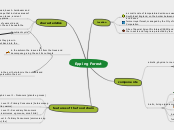Epping Forest
location
a small scale of temperature deciduous woodland in South-
East England, on the border between London and Essex
former royal forest, managed by the City of London Corporation
Site of Special Scientific Interest (SSSI) and many of the insects and fungi are protected by law
components
abiotic, physical or non
living organisms
temperature, humidity
light
water
wind, carbon dioxide, oxygen
pH
rocks
nutrients in the soil
biotic, living
organisms
plants
animals
humans
bacteria
fungi
characteristics
Broad leaf trees such as oak, beech. hornbeam
and elm. It has diverse landscape that includes areas
of historic wood, pasture, green lanes, ancient pollarded
trees and grassy plains
Many of the trees are hundreds of years old and support many insects and fungi. the soil beneath the forest is a fertile brown earth
nutrient cycle
in the autumn the leaves fall from the trees and decompose,
giving the soil its nutrients
earth worms in the soil help to mix the nutrients
and blend the layers within the soil
the tree roots are deep so help to break up the rock
below. this helps to give the soil more nutrients
the trees take up nutrients in the soil as they grow in summer. However, more nutrients are put back into the soil in autumn
features of the food chain
Trophic Level 1 - Producers (plants eg moss)
Trophic Level 2 - Primary Consumers (herbivores
eg caterpillar, worms)
Trophic Level 3 - Secondary Consumers (smaller
carnivores eg mouse, small bird)
Trophic Level 4 - Tertiary Consumers (omnivores eg
badger, owl, fox)
